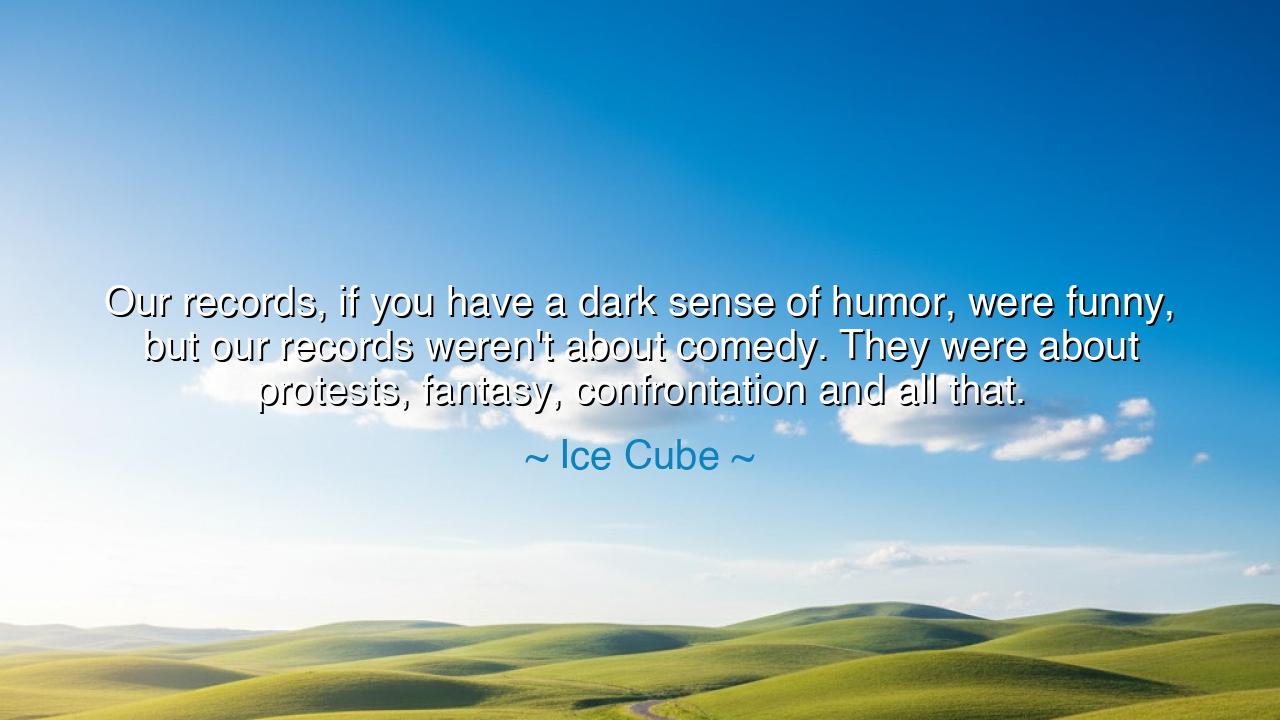
Our records, if you have a dark sense of humor, were funny, but
Our records, if you have a dark sense of humor, were funny, but our records weren't about comedy. They were about protests, fantasy, confrontation and all that.






The artist Ice Cube, a voice forged in the heat of truth and rebellion, once said: “Our records, if you have a dark sense of humor, were funny, but our records weren’t about comedy. They were about protests, fantasy, confrontation, and all that.” In these words lies not the jest of an entertainer, but the testimony of a prophet of his age — one who wielded rhythm and rhyme as weapons of awakening. His art, born from the streets and the struggle, was laughter mixed with fire, humor bound to truth, and anger sculpted into sound. To those who listened with shallow ears, his work seemed violent or crude; but to those who understood, it was revelation — the voice of a generation that refused to remain silent.
When Ice Cube speaks of a “dark sense of humor,” he does not speak of cruelty, but of resilience — the laughter of those who survive in a world that would rather erase them. Such humor is the smile in the face of oppression, the wit that defies despair. It is the ancient laughter of the enslaved who sang through their chains, of the downtrodden who mock the tyrant behind his back. Humor, in this sense, becomes a form of protest — a flame that refuses to be extinguished. In Cube’s words, the records may carry the tone of jest, but their essence is defiance. Their rhythm is confrontation; their message, freedom.
The ancients, too, knew this sacred union between laughter and rebellion. In the crowded theaters of Athens, the playwright Aristophanes once mocked the powerful with biting satire, using comedy as a blade sharper than any sword. His plays ridiculed war, corruption, and hypocrisy, and yet the people laughed — not because they were blind, but because they were waking up. His humor carried the same dark wisdom that Ice Cube speaks of: the kind that laughs while bleeding, that smiles while shouting for justice. Both men, though centuries apart, understood the same truth — that laughter, when fused with truth, can break chains the sword cannot.
Yet Cube also speaks of fantasy, for where reality wounds, imagination heals. His records were not only protests against the world as it was, but visions of the world as it could be. Within his words, he built empires of pride and identity where society had offered only neglect. He gave voice to those who had been silenced, shaping myth out of marginalization. This is the alchemy of art — to turn pain into power, and anger into creation. The prophets of old wrote their visions on scrolls; Ice Cube wrote his on vinyl, but the message was the same: We are here, we matter, and we will not bow.
He speaks, too, of confrontation — not as violence, but as truth spoken without fear. Every great movement begins in confrontation, when silence can no longer protect the soul. His music challenged injustice not with sermons, but with stories — raw, rhythmic, unfiltered. Through that confrontation, he forced a nation to look at itself. The poet Langston Hughes once said, “I am America — yet America does not see me.” Ice Cube, through his art, demanded that the unseen be seen. His confrontation was not destruction; it was revelation. For when truth rises, the false must tremble.
And yet, amidst all this power, Cube reminds us that his music was never about comedy, but about courage. The laughter within it was not escape, but armor — the dark humor of survival. This kind of humor is sacred; it is the laughter of the warrior who knows the battle is endless but fights anyway. It is the humor of the oppressed who refuse to let sorrow claim their spirit. It is the humor of truth, sharp enough to cut, strong enough to heal.
The lesson is eternal: laughter and protest are not opposites — they are allies. In your own life, when you face injustice, do not let despair consume you. Speak truth, even when it shakes the earth. Use your gifts — your voice, your art, your courage — as weapons of light. Let your humor remain dark if it must, for even in darkness, laughter can be divine. Be willing to confront, to imagine, to protest, and above all, to create. For creation is the highest form of rebellion.
And remember this, children of truth: the voice that dares to laugh while fighting for justice is unstoppable. As Ice Cube teaches, let your words carry both thunder and wit, both fury and grace. For humor that rises from pain, when joined with conscience, becomes not mockery but power — and through such power, the world is changed.






AAdministratorAdministrator
Welcome, honored guests. Please leave a comment, we will respond soon